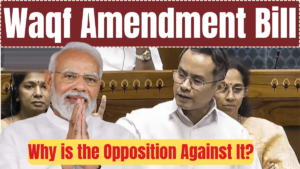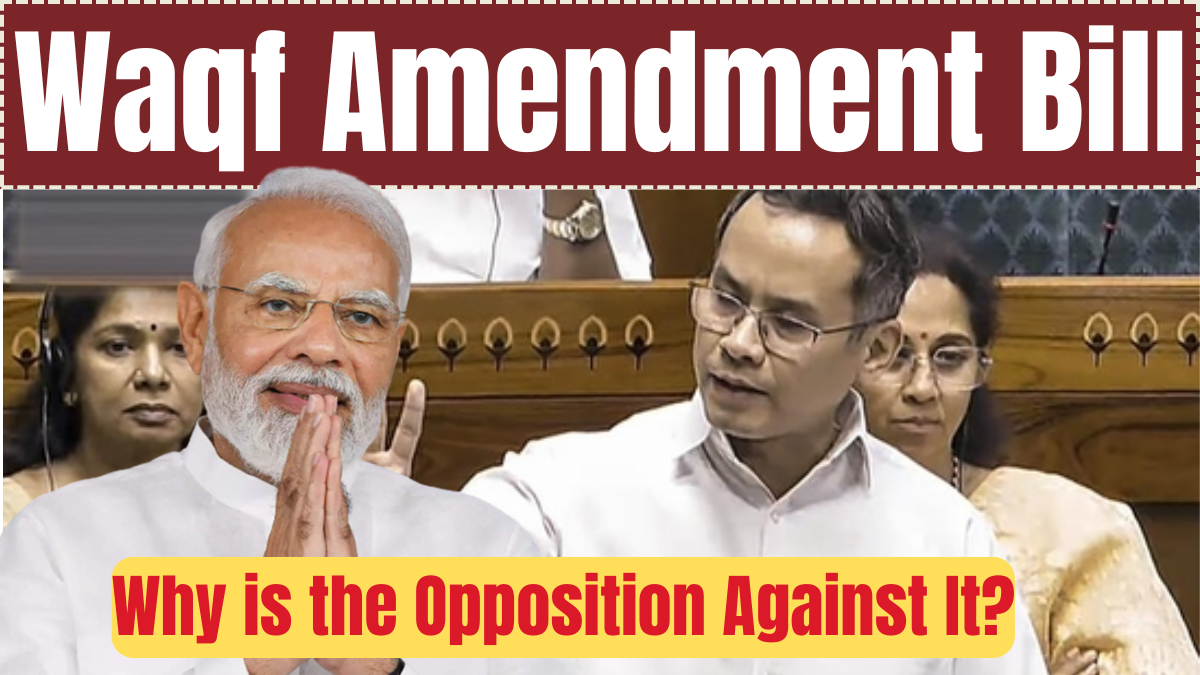The Waqf (Amendment) Bill 2024 has ignited a heated debate in Parliament, drawing strong reactions from both the government and opposition parties. The bill, which proposes significant changes to the Waqf Act of 1995, aims to address issues in the regulation and management of Waqf properties in India. However, it has also become a flashpoint for political conflict, with the opposition vehemently opposing several provisions.

What is the Waqf (Amendment) Bill 2024?
The primary objective of the Waqf (Amendment) Bill 2024 is to enhance the management and administration of Waqf properties in India. Waqf refers to properties that are dedicated to religious or charitable purposes under Islamic law. These properties are not allowed to be sold or used for any purpose other than their intended religious or charitable function.
India, which has the largest Waqf holdings in the world, manages over 8.7 lakh properties spanning 9.4 lakh acres, making the Waqf Board the third-largest landowner in India, following the Armed Forces and Indian Railways. However, there have been concerns about the mismanagement and misuse of these properties, which the bill seeks to address.
Key Features of the Waqf (Amendment) Bill 2024
The amendment bill proposes several major changes to the original Waqf Act of 1995:
-
Renaming the Waqf Act: The bill suggests renaming the Waqf Act to the “Unified Waqf Management, Empowerment, Efficiency, and Development Act, 1995”. This new name reflects the bill’s emphasis on improving the administration of Waqf properties.
-
Increased Representation: One of the key features of the bill is the inclusion of Muslim women and non-Muslim people in the Waqf boards. This is a significant shift as traditionally, the Waqf boards have been dominated by male members of the Muslim community.
-
Government Properties Identified as Waqf: The bill stipulates that any government property identified as Waqf will cease to be categorized as such, thus limiting the scope of Waqf property ownership.
-
Increased Oversight: The bill empowers the central government to make rules regarding the registration, publication of accounts, and proceedings of the Waqf boards. It also allows the government to order audits of Waqf accounts by the Comptroller and Auditor General (CAG) or a designated officer.
-
Authority Shift to District Collectors: The bill proposes that district collectors will be empowered to determine whether a property constitutes Waqf, potentially undermining the authority of the Waqf boards. This provision has been one of the most contentious aspects of the bill.
Why is the Opposition Against the Waqf (Amendment) Bill 2024?
The opposition has expressed strong discontent with the proposed Waqf (Amendment) Bill, calling it unconstitutional and divisive. Key opposition leaders, including Congress’s Rahul Gandhi, Mallikarjun Kharge, and NCP’s Supriya Sule, have raised concerns about the bill’s provisions.
Opposition’s Claims:
-
Unconstitutional Approach: Opposition leaders argue that the bill has been introduced in a manner that disregards the suggestions of the Joint Parliamentary Committee (JPC), which examined the original draft. Congress leader Khaleequr Rahman stated that the bill is unconstitutional and claimed that the government was trying to bulldoze the legislative process without considering the opposition’s recommendations.
-
Erosion of Waqf Board Authority: One of the primary points of contention is the shift in authority from Waqf boards to district collectors. Congress MP Kiran Kumar Chamala and other opposition members fear that this move undermines the autonomy of the Waqf boards, allowing bureaucrats to have more control over religious and charitable properties.
-
Discriminatory Impact: The opposition has voiced concerns that the bill could potentially “de-establish” a particular community, particularly in how the amendments address the involvement of Muslim women and non-Muslim representatives in Waqf boards. The concern is that these provisions may further divide communities and create an atmosphere of distrust.
-
Resistance to Central Control: Many opposition parties argue that giving the central government more control over the Waqf boards’ functions, such as the power to audit and set rules, centralizes too much power in the hands of the government, thus diminishing the self-regulatory ability of the boards.
What’s at Stake?
The debate surrounding the Waqf (Amendment) Bill is not only about the legal status of Waqf properties but also about the balance of power between the central government and religious institutions. The Waqf properties have long been a sensitive issue, particularly in a country as diverse as India, where land ownership and religious autonomy are often intertwined with socio-political considerations.
The government, defending the bill, argues that the amendments will modernize and streamline the management of Waqf properties, making them more efficient and transparent. However, the opposition views the bill as an attempt to undermine the democratic functioning of religious bodies and to centralize power in ways that could have long-term implications for minority rights.
Conclusion
The Waqf (Amendment) Bill 2024 is poised to bring significant changes to the administration and management of Waqf properties in India. While the government aims to improve efficiency and transparency, the opposition fears that the bill could undermine the autonomy of Waqf boards, centralize power excessively, and affect minority rights. As the bill moves through Parliament, it is likely to spark continued debate on its implications for religious and charitable institutions in India.
Click here to know more.
Aanchal is a passionate writer with a keen interest in storytelling, content creation, and creative expression. She enjoys exploring diverse topics and crafting engaging narratives that captivate readers.

